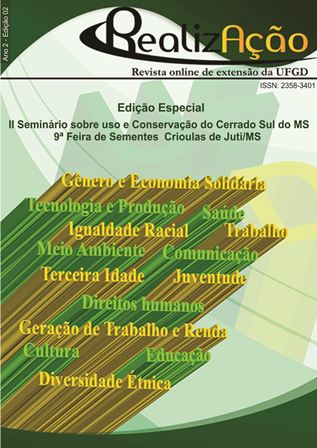Experiences of a group of women in creating an artisanal flour mill in the Guanabara settlement, Juti, MS
DOI:
https://doi.org/10.30612/realizacao.v1i2.3278Keywords:
Family farming , Cassava , Biju flourAbstract
The creation of the flour mill by the group of women formed in the Guanabara Settlement was a very important experience for the families involved, so this paper intends to report on the actions taken since the creation of the artisanal flour mill to the present moment. In meetings with the women of the settlement, based on the experience of some of them, we decided to set up a flour mill. We took a course with an acquaintance and learned how to make biju flour. When we had orders for biju flour and toasted regular flour from the residents of the settlement and from customers in other locations, we would get together to make it. In 2012, the net income was R$1,000.00 (one thousand reais), and it was agreed among the members of the flour mill to divide it equally. Making biju flour has been worthwhile, as it is a highly appreciated product, but because we do not have a CNPJ, we have had difficulty participating in projects and even obtaining more resources to expand the business. Currently, the flour mill has been in existence for 7 years and is still fully operational, making biju flour and toasted flour for its own consumption and for orders from the region.
Downloads
Downloads
Published
How to Cite
Issue
Section
License
Copyright (c) 2014 Leila Cristine Seline Dorce, Clarice Gonçalves dos Santos Amaral, Júlio Cézar Amaral, Shaline Séfara Lopes Fernandes, Carla Tais Nevoleti Correia Lima, Matheus Vinicius Dorce

This work is licensed under a Creative Commons Attribution-NonCommercial-ShareAlike 4.0 International License.
Autores que publicam nesta revista aceitam as normas de publicação, bem como, concordam com os seguintes termos:
(a) O Conselho Editorial se reserva ao direito de efetuar, nos originais, alterações da Língua portuguesa para se manter o padrão culto da língua, respeitando, porém, o estilo dos autores.
(b) Autores mantêm os direitos autorais e concedem à revista o direito de primeira publicação, com o trabalho simultaneamente licenciado sob a Creative Commons Atribuição-NãoComercial-CompartilhaIgual 4.0 Internacional que permite: Compartilhar — copiar e redistribuir o material em qualquer suporte ou formato e Adaptar — remixar, transformar, e criar a partir do material. A Creative Commons Atribuição-NãoComercial-CompartilhaIgual 4.0 Internacional considera os termos seguintes:
- Atribuição — Você deve dar o crédito apropriado, prover um link para a licença e indicar se mudanças foram feitas. Você deve fazê-lo em qualquer circunstância razoável, mas de nenhuma maneira que sugira que o licenciante apoia você ou o seu uso.
- NãoComercial — Você não pode usar o material para fins comerciais.
- CompartilhaIgual — Se você remixar, transformar, ou criar a partir do material, tem de distribuir as suas contribuições sob a mesma licença que o original.
- Sem restrições adicionais — Você não pode aplicar termos jurídicos ou medidas de caráter tecnológico que restrinjam legalmente outros de fazerem algo que a licença permita.


